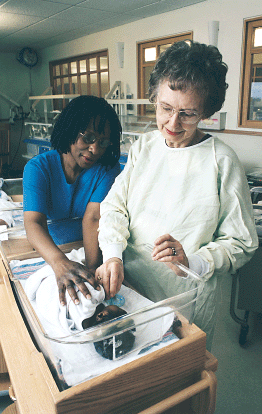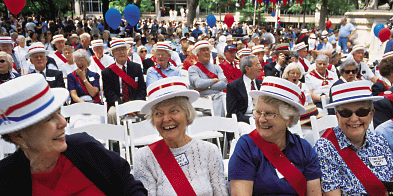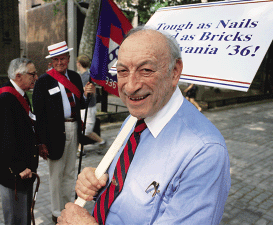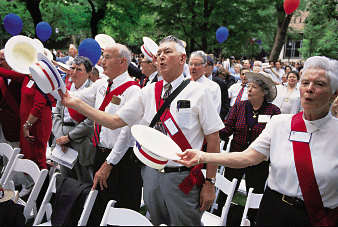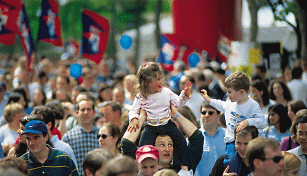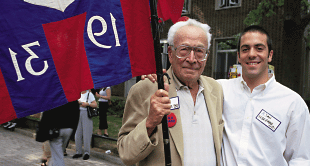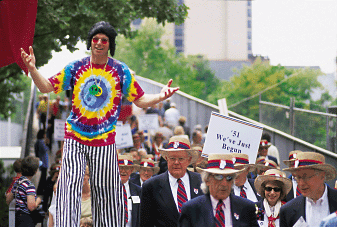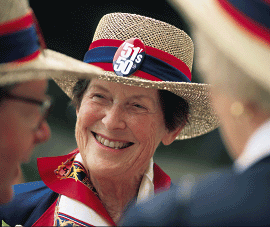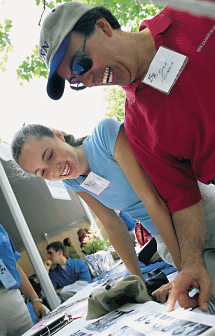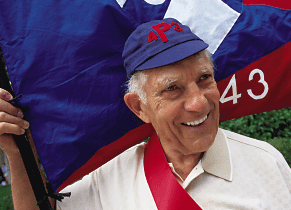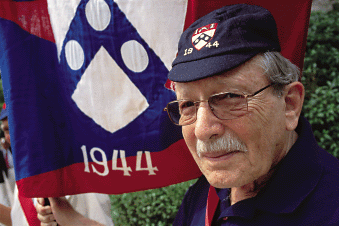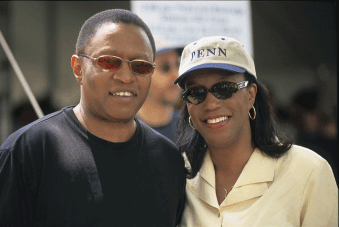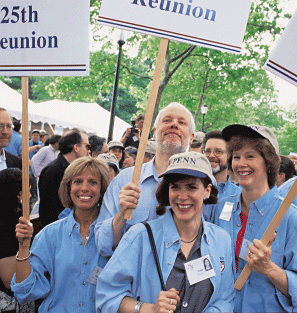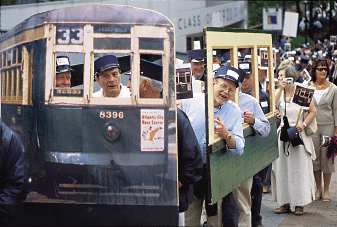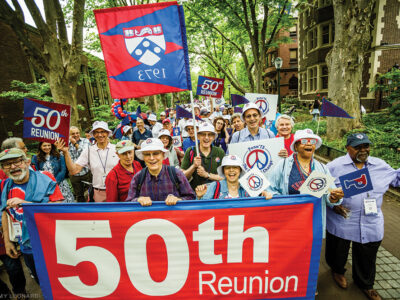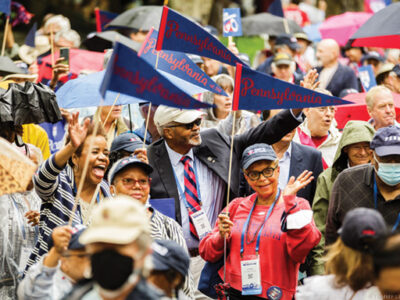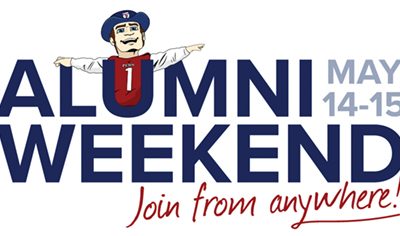Slideshow | Photography by Tommy Leonardi C’89
WAR YEARS REUNION
“Life Was Not Carefree”
Penn’s “greatest generation” comes back to campus for the first-ever War Years Reunion.
By Helene Hollander Lepkowski | Photography by Candace diCarlo
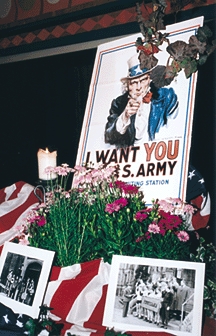
The two signs flanking the entrance to Irvine Auditorium read “Welcome to the War Years Reunion.” And welcome they were, as more than 300 men and women from the classes of 1942 through 1949 gathered together on May 19 for a landmark evening of reminiscence, tribute, and reconnection. The atmosphere inside Irvine, where CBS News legend Mike Wallace spoke (filling in for an ailing Art Buchwald), and later at dinner in Houston Hall’s Hall of Flags, was nostalgic and festive. There were World War II posters—“For Freedom’s Sake Buy War Bonds,” “We Can Do It,” “United We Are Strong … United We Will Win”—strains of Benny Goodman, Count Basie, and Tommy Dorsey, and lots of food, drink, laughter, and buoyant conversation.
For some, the reunion was another chance to see friends, classmates, and fraternity brothers they’d kept in touch with over the years. But for many of the men—those who began their undergraduate years in one class and who, because of their military service, graduated from another—this was a special time to reunite with classmates they hadn’t seen for more than half a century. It was also an opportunity to reconnect physically and emotionally with the University itself.
“The war was very disruptive,” says Doris Stevens Magers CW’42. “A lot of the men were called away before they were able to complete their college courses, and then when they came back, they had started out with one class and finished up with another. And I think a great deal of interest in a particular class was lost in the transition. I think a lot of them didn’t know which class they belonged to.”
Harold Buxbaum W’45, who, because of his war service, graduated in 1947 (alumni have the option of affiliating with their original class or the one they graduated with), experienced that disconnect firsthand. Only one person whom he knew—a graduate from the Class of 1946—attended his 50th Reunion in 1995. “I didn’t know anybody from ’45,” Buxbaum recalls. That experience led him to write a letter to the Gazette in 1996 “proposing that we ought to have a reunion of those years to reconnect people with the University.”

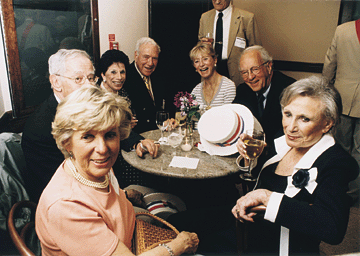
Over time, other alumni began expressing enthusiasm for such an event. Last summer Buxbaum, Seymour Finkelstein W’46, Richard Kaskey W’43, and Leroy Rubin W’45, met with Rebecca Sloviter, an assistant director of alumni relations, who, Buxbaum says, became “the guiding light behind this thing,” and helped turn the idea into reality—along with a 22-member planning committee representing each War Years class.
Buxbaum graduated from Penn with a major in accounting at age 22, less than six years after he arrived as a 16-year-old freshman by train from New York in 1941. Those were the days of beanies, big name buttons, and the VIG (vigilante book) with its rules and regulations. But all that changed on December 7. “I lived in Magee on the lower quad and we were coming out about noon and a friend of mine yelled out that ‘the Japs just bombed Pearl Harbor.’”
For the next year and a half “things changed very dramatically,” Buxbaum remembers. “My friends either enlisted or got drafted. I joined Phi Sigma Delta fraternity and one of my fraternity brothers was Bill Lavin and Bill’s brother was a P-38 pilot in Alaska, and he was one of the first American aces. He came to the fraternity house. All of us were goggle-eyed. He described with his hands what a dogfight was like, and a lot of us went Army Air Corps after that.”
In the Air Corps, Buxbaum took navigator, bombardier, and radar training to become a “radar observer” on a B-29, the “Super Fortress,” which he flew in the 398th Bomb Squadron, 20th Air Force. He arrived on Tinian, one of the Mariana Islands of the South Pacific, a month short of the end of World War II, and was based there and in the Philippines until he returned home.
When Buxbaum returned to the University, he felt different from his classmates. “We were much older. We were very different. Most of us had been through some pretty horrific stuff. Let’s put it this way: When I got married at 24 it was like being 28 or 30 because of the experiences. A kid coming in fresh out of high school didn’t have that.”
Richard Kaskey W’43 was able to graduate a few months prior to being inducted into the Air Corps, in April ’43. He went to basic training in Miami Beach, but when he took a test for aerial gunnery, they found that his eyes were below the minimum standard, so he was discharged.
Although his actual war service was short-lived, Kaskey nevertheless served his Alpha Epsilon Pi fraternity brothers from the fall of 1943 until 1946 through a newsletter he edited called Gammaphone that published brothers’ letters. “We probably had several hundred members in the service—Army, Navy, Air Corps, Marines—and this publication went to all of them,” says Kaskey. “All they had to do was send in one letter and everybody read it.”
Kaskey attended his class reunion about 25 years ago, and has returned to campus every Alumni Weekend since. For the past three years he has served as class president. He was thrilled that classmates he hadn’t seen since 1944 came to this reunion. “We’ve talked about memories, and my memories of Penn were always good,” he says.
Doris Stevens Magers and her late husband, William “Bill” Magers W’42 (he died in 1997), had completed their undergraduate studies before Bill was drafted into the Army and Doris applied to the WAVES. Though they met at Penn, they were unmarried when Bill became an aircraft mechanic with the Army Air Corps’ Ferry Command, stationed in El Paso, Texas.
Doris went into the first officers-training class for WAVES at Smith College in October 1942. From there she was assigned to the Naval Intelligence Division in Washington. For the rest of the war (even after she and Bill married in 1943) she did “top secret” coding and decoding work related to the sinking of Japanese ships—“which we did,” she says, her tone expressing the excitement she felt then, and still feels about her war service. “You were right where things were happening. We received a citation for our work.”
Unlike many of the other 1940s classes, the class of ’42, Magers thinks, has retained its cohesion because of the war. “When everybody came back from the war, we were so anxious to see each other again. The majority of the men were able to finish their studies in our class. We have stayed one of the closest classes of the university.”
Magers says her College for Women class was especially close. “Penn was so different then than it is today. When we were there the women were totally separate from the men. We were a close-knit group with 180 to 200 in the class. I could call all the women by name. We socialized with the men but our classes were separate.” She also recalls how “Houston Hall was off-limits to women, and some of the women hold quite a grudge about that even until today.”
As a reporter for the women’s newspaper, The Bennett News, Leona T. Feldman CW’46 G’50 took up the admission of women to Houston Hall and other causes “against the establishment, fighting for what was right and just,” she says. “I guess I was one of the first who really began to fight for women’s rights. I hadn’t heard about people doing that until the ’60s.”
Despite those battles, Feldman was happy to be attending the reunion. “It’s like recapturing the past,” she says. “When I attended the College for Women, my parents were alive, life was just opening up. It’s like going back to that time. It’s good to be back here.”
Feldman and Maxine Magaziner Flock Ed’44 reminisced about campus life during the war years. “The war had an impact on all our lives,” says Flock. “On the surface, college was what you would expect. Football games, college programs, social activities, sorority and fraternity functions rounded out our lives as we pursued our educational goals and volunteered in various war efforts. But there was a different feeling about college.
“How could there help but be, when many students’ lives were disrupted by going off to war, and while those of us back home had family members, boy friends, girl friends, and fiancés called into service? We lived with shadows of concern and loss. Life was not carefree.”
Helene Hollander Lepkowski CW’66 GRP’78 last wrote for the Gazette about her father, a navigator-bombardier on a B-25 in the China-Burma-India Theater in World War II [“Alumni Voices,” January/ February].


